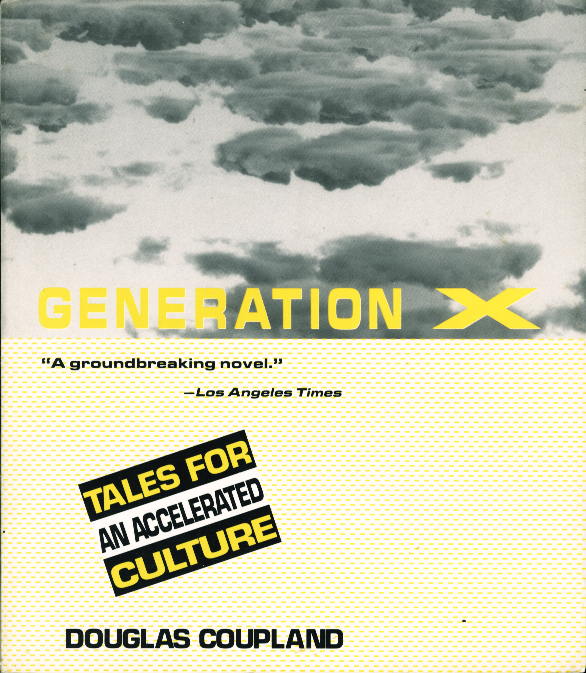With a narrative reminiscent of Chaucer’s The Canterbury Tales and Boccaccio’s The Decameron, Coupland’s breakout novel, Generation X: Tales for an Accelerated Culture, while a mouth full, is perhaps one of the best chronicles of the post-baby-boomer generation. Written in 1991 after Coupland wrote an article in 1987 in Vancouver Magazine about how different the Baby Boomer generation was from the 1960-1980 generation, i.e. Generation X.
It was originally intended to be a handbook, but I guess seemed more attractive as an actual story-telling novel. While there are some narrative themes in which Coupland directly takes the reader out of the narrative to explain something, much like a handbook, it is very much a linear-flowing story. And quite a compelling story at that.
Coupland is known for his use of modern, technological references in his books, as well as his Beat-Generation-like affinity for making up hip, fused words to describe an utterly new feeling and interaction within society. Some of the most prevalent ones were the title, Generation X, which would eventually beget Generation Y, then Generation Z, and any other alphabetical categorization of generational cultural differences, and then McJobs to denote any low paying, low prestige, dead-end jobs.
The story is about three friends, Andy Palmer, Claire Baxter, and Dag Bellinghausen, all of whom are highly overeducated, under thirty, and living in the Mojave Desert in lower California. Rather than dealing with life, they’ve already somehow independently come to the conclusion that the only way to live free in a progressively advancing society of bourgeois values and consumerism philosophy is to isolate themselves in a desolate environment devoid of any markers of social change since the Eisenhower era. Perhaps Coupland was asking, through the platform of these three fictional characters, if such a freedom was possible in this day in age, or if we were doomed to and an interconnected, interdependent life of buy-spend, buy-spend based on fluctuating levels of supply and demand.
 It is an essential question that I believe everyone should ask at some point in their life: Are we just a target market to be sold and pandered to, or are we living, idiosyncratic beings? It seems like Coupland’s books serves a nigh hypocritical purpose. By declaring independence from this consumerist ideology ingrained within the Baby Boomer, Coupland confines an entire generation as Generation X, the marginalized generation who flee from the mass society but invariably meet up with each other on the other side, creating not a non-consumerist generation but rather a new target market. It’s truly lamentable, but with the popularization of MTV, VH1, Comedy Central, and other Generation X networks, it is undeniable that Generation X became the very thing and ideology that it detested.
It is an essential question that I believe everyone should ask at some point in their life: Are we just a target market to be sold and pandered to, or are we living, idiosyncratic beings? It seems like Coupland’s books serves a nigh hypocritical purpose. By declaring independence from this consumerist ideology ingrained within the Baby Boomer, Coupland confines an entire generation as Generation X, the marginalized generation who flee from the mass society but invariably meet up with each other on the other side, creating not a non-consumerist generation but rather a new target market. It’s truly lamentable, but with the popularization of MTV, VH1, Comedy Central, and other Generation X networks, it is undeniable that Generation X became the very thing and ideology that it detested.
But what do I know, I’m a part of Generation Y that came after Generation X, and which Coupland called “global teens.”
Anyway, Coupland is heavily influenced by creative sociologists, especially Marshall McLuhan, who he eventually wrote a biographical book about, and it is evidenced in his book about the infamous Generation X. And while there lacks an overall plot, much like Seinfeld, it does represent the essential piece of literature to document and encompass a generation of angst and rebellion against corporatocracy that it necessary to understanding how we arrived from the 1990s to now.





